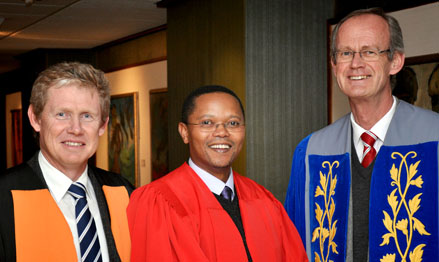Latest News Archive
Please select Category, Year, and then Month to display items
12 January 2024
|
Story Nonsindiswe Qwabe
|
Photo Sonia Small
 Since joining the UFS in 2008, Dr Grey Magaiza has worked extensively on approaches that can foster the socio-economic transformation of societies.
Since joining the UFS in 2008, Dr Grey Magaiza has worked extensively on approaches that can foster the socio-economic transformation of societies.
“The future should be one where communities can decide on their development agenda and futures. That’s the most important for me.” Dr Grey Magaiza, Deputy Director of the Centre for Gender and Africa Studies (CGAS) and Head of the Community Development programme on the Qwaqwa Campus, is passionate about capacitating communities to be agents of change and advancement. His vision for the future emphasises the empowerment of communities to take charge of their development by actively participating in decision making and the implementation of development projects that can improve their lives.
Since joining the UFS in 2008, Dr Magaiza has worked extensively on approaches that can foster the socio-economic transformation of societies. Over the years, he has crafted his research speciality into one that he is most proud of – being an interdisciplinary scientist immersed in the development of communities.
“I’m in a fortunate position of researching what I like. I say ‘fortunate’, because I’ve taken the time to understand what I’m passionate about, which is the overall field of rural livelihoods and livelihood futures – in short, community development. My research starts from an engaged university, understanding the elements that a university must use to enhance transformation and relevance to its immediate community in terms of development.”
One of the ways he has done this is by looking at social entrepreneurship as a development approach for young people in a rural setting. Through workshops with non-profit and civic organisations in Qwaqwa, Dr Magaiza has been helping these organisations to map out their needs and actively meet them through the involvement and support of external role players.
“We understand that communities are part of the national development agenda, but even that national agenda respects community knowledge and intentions and allows communities to shape their identity. A critical enabler of this is community organising. You bring back the capacity in communities to have dialogues on issues affecting them as spaces for engagement, knowledge exchange, and for people to just talk about their way forward.”
By enabling communities to define their development agenda, they can address their specific needs, challenges, and aspirations, he said. “When I look at livelihood futures, it’s quite an exciting aspect of my work – it’s like looking into a fortune tellers’ globe, because you’re not deciding for communities what they should do, but the communities themselves take those decisions.”
Inaugural lecture by Prof Kwandiwe Kondlo
2011-08-26
|

|
|
Present at the inaugural lecture of Prof Kwandiwe Kondlo were from the left: Prof. Lucius Botes, Dean of the Faculty of Humanities; Prof. Kwandiwe Kondlo and Prof. Teuns Verschoor, Vice-Rector: Institutional Affairs
Photo: Stephen Collett
|
Can the South African Communist Party (SACP) ever become a viable option for the ANC or has it become just a flat spare-tyre of the ruling party? Is there more to expect from the SACP or has it run full cycle? These are some of the questions that were brought up by Prof. Kwandiwe Kondlo at his inaugural lecture at our university on 24 August 2011.
Prof. Kondlo, head of our Centre for Africa Studies, told the audience that the current SACP (unlike pre-1994) is a party in which theory and intellectual reflection were being eclipsed by politics of pragmatism and warned that self-interest and ambition have become a problem. Delivering his lecture on the topic The South African Communist Party and the Dilemma of the National Democratic Revolution in South Africa, 1994 to date, Prof. Kondlo warned that he may ruffle feathers amongst those with ideological commitments and said that as an intellectual it was his job to irritate.
Prof. Kondlo told the audience his lecture would re-open old debates telling them that old questions are making way to the fore, for example the nationalisation debate.